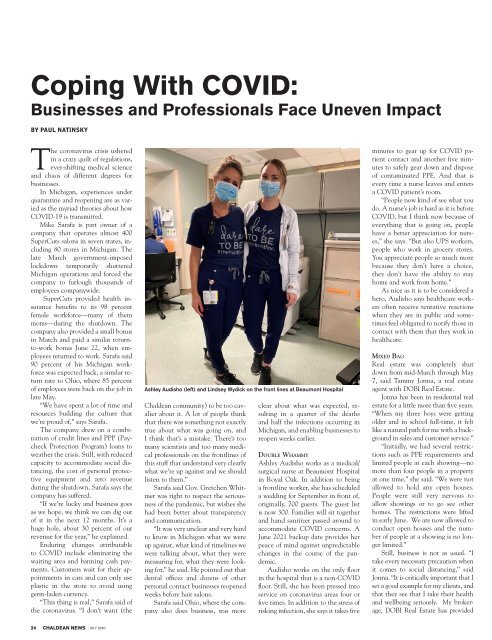You also want an ePaper? Increase the reach of your titles
YUMPU automatically turns print PDFs into web optimized ePapers that Google loves.
Coping With COVID:<br />
Businesses and Professionals Face Uneven Impact<br />
BY PAUL NATINSKY<br />
The coronavirus crisis ushered<br />
in a crazy quilt of regulations,<br />
ever-shifting medical science<br />
and chaos of different degrees for<br />
businesses.<br />
In Michigan, experiences under<br />
quarantine and reopening are as varied<br />
as the myriad theories about how<br />
COVID-19 is transmitted.<br />
Mike Sarafa is part owner of a<br />
company that operates almost 400<br />
SuperCuts salons in seven states, including<br />
80 stores in Michigan. The<br />
late March government-imposed<br />
lockdown temporarily shuttered<br />
Michigan operations and forced the<br />
company to furlough thousands of<br />
employees companywide.<br />
SuperCuts provided health insurance<br />
benefits to its 98 percent<br />
female workforce—many of them<br />
moms—during the shutdown. The<br />
company also provided a small bonus<br />
in March and paid a similar returnto-work<br />
bonus June 22, when employees<br />
returned to work. Sarafa said<br />
90 percent of his Michigan workforce<br />
was expected back, a similar return<br />
rate to Ohio, where 85 percent<br />
of employees were back on the job in<br />
late May.<br />
“We have spent a lot of time and<br />
resources building the culture that<br />
we’re proud of,” says Sarafa.<br />
The company drew on a combination<br />
of credit lines and PPP (Paycheck<br />
Protection Program) loans to<br />
weather the crisis. Still, with reduced<br />
capacity to accommodate social distancing,<br />
the cost of personal protective<br />
equipment and zero revenue<br />
during the shutdown, Sarafa says the<br />
company has suffered.<br />
“If we’re lucky and business goes<br />
as we hope, we think we can dig out<br />
of it in the next 12 months. It’s a<br />
huge hole, about 30 percent of our<br />
revenue for the year,” he explained.<br />
Enduring changes attributable<br />
to COVID include eliminating the<br />
waiting area and banning cash payments.<br />
Customers wait for their appointments<br />
in cars and can only use<br />
plastic in the store to avoid using<br />
germ-laden currency.<br />
“This thing is real,” Sarafa said of<br />
the coronavirus. “I don’t want (the<br />
Ashley Audisho (left) and Lindsey Wydick on the front lines at Beaumont Hospital<br />
Chaldean community) to be too cavalier<br />
about it. A lot of people think<br />
that there was something not exactly<br />
true about what was going on, and<br />
I think that’s a mistake. There’s too<br />
many scientists and too many medical<br />
professionals on the frontlines of<br />
this stuff that understand very clearly<br />
what we’re up against and we should<br />
listen to them.”<br />
Sarafa said Gov. Gretchen Whitmer<br />
was right to respect the seriousness<br />
of the pandemic, but wishes she<br />
had been better about transparency<br />
and communication.<br />
“It was very unclear and very hard<br />
to know in Michigan what we were<br />
up against, what kind of timelines we<br />
were talking about, what they were<br />
measuring for, what they were looking<br />
for,” he said. He pointed out that<br />
dental offices and dozens of other<br />
personal contact businesses reopened<br />
weeks before hair salons.<br />
Sarafa said Ohio, where the company<br />
also does business, was more<br />
clear about what was expected, resulting<br />
in a quarter of the deaths<br />
and half the infections occurring in<br />
Michigan, and enabling businesses to<br />
reopen weeks earlier.<br />
Double Whammy<br />
Ashley Audisho works as a medical/<br />
surgical nurse at Beaumont Hospital<br />
in Royal Oak. In addition to being<br />
a frontline worker, she has scheduled<br />
a wedding for September in front of,<br />
originally, 700 guests. The guest list<br />
is now 300. Families will sit together<br />
and hand sanitizer passed around to<br />
accommodate COVID concerns. A<br />
June 2021 backup date provides her<br />
peace of mind against unpredictable<br />
changes in the course of the pandemic.<br />
Audisho works on the only floor<br />
in the hospital that is a non-COVID<br />
floor. Still, she has been pressed into<br />
service on coronavirus areas four or<br />
five times. In addition to the stress of<br />
risking infection, she says it takes five<br />
minutes to gear up for COVID patient<br />
contact and another five minutes<br />
to safely gear down and dispose<br />
of contaminated PPE. And that is<br />
every time a nurse leaves and enters<br />
a COVID patient’s room.<br />
“People now kind of see what you<br />
do. A nurse’s job is hard as it is before<br />
COVID, but I think now because of<br />
everything that is going on, people<br />
have a better appreciation for nurses,”<br />
she says. “But also UPS workers,<br />
people who work in grocery stores.<br />
You appreciate people so much more<br />
because they don’t have a choice,<br />
they don’t have the ability to stay<br />
home and work from home.”<br />
As nice as it is to be considered a<br />
hero, Audisho says healthcare workers<br />
often receive tentative reactions<br />
when they are in public and sometimes<br />
feel obligated to notify those in<br />
contact with them that they work in<br />
healthcare.<br />
Mixed Bag<br />
Real estate was completely shut<br />
down from mid-March through May<br />
7, said Tammy Jonna, a real estate<br />
agent with DOBI Real Estate.<br />
Jonna has been in residential real<br />
estate for a little more than five years.<br />
“When my three boys were getting<br />
older and in school full-time, it felt<br />
like a natural path for me with a background<br />
in sales and customer service.”<br />
“Initially, we had several restrictions<br />
such as PPE requirements and<br />
limited people at each showing—no<br />
more than four people in a property<br />
at one time,” she said. “We were not<br />
allowed to hold any open houses.<br />
People were still very nervous to<br />
allow showings or to go see other<br />
homes. The restrictions were lifted<br />
in early June. We are now allowed to<br />
conduct open houses and the number<br />
of people at a showing is no longer<br />
limited.”<br />
Still, business is not as usual. “I<br />
take every necessary precaution when<br />
it comes to social distancing,” said<br />
Jonna. “It is critically important that I<br />
set a good example for my clients, and<br />
that they see that I take their health<br />
and wellbeing seriously. My brokerage,<br />
DOBI Real Estate has provided<br />
24 CHALDEAN NEWS <strong>JULY</strong> <strong>2020</strong>

















